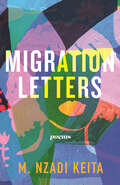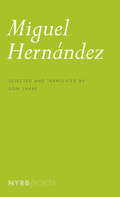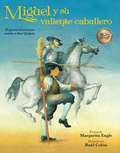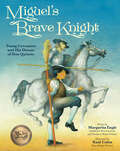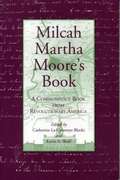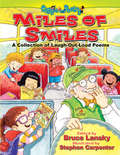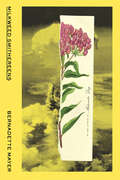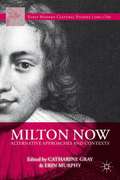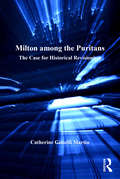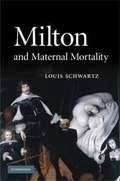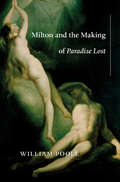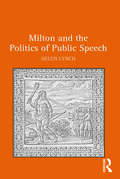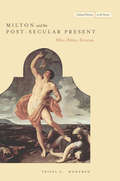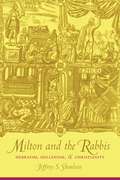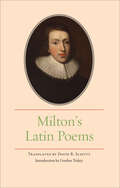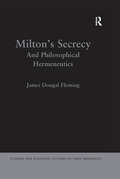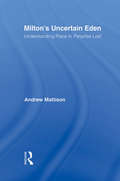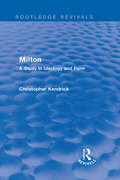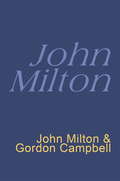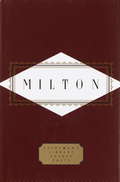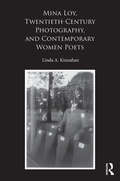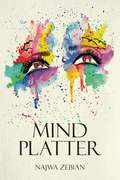- Table View
- List View
Migration Letters: Poems (Raised Voices #5)
by M. Nzadi KeitaA poetry collection that reflects on intimate aspects of Black history, culture, and identity, revealing an uncommon gaze on working-class Philadelphia from the 1960s to the present dayIn 55 poems, Migration Letters straddles the personal and public with particular, photorealistic detail to identify what, over time, creating a home creates in ourselves. Drawn from her experiences of being born in Philadelphia into a Black family and a Black culture transported from the American South by the Great Migration, M. Nzadi Keita&’s poetry sparks a profoundly hybrid gaze of the visual and the sensory. Her lyrical fragments and sustained narrative plunge into the unsung aspects of Black culture and explore how Black Americans journey toward joy.Propelled by the conditions that motivated her family&’s migration north, the poems pull heavily from Keita&’s place in her family, communities, and the world at large. They testify to her time and circumstances growing up Black in Philadelphia on the periphery of the civil rights and Black Power movements. Each poem builds upon an inheritance of voices: a panoramic perspective of an Easter Sunday service in a Black church gives way to an account of psychic violence in a newly integrated school; the collective voices of a beauty salon&’s patrons fragment into memories of neighborhoods in North Philadelphia that have faded over time.Migration Letters strives to tell a story about Black people that radiates across generations and testifies to a world that, as Lucille Clifton wrote, &“has tried to kill [us] and has failed.&” They interrogate how one&’s present begins in the past, what we gain from barriers and boundaries, and what notions of progress energize our journey forward. Keita&’s poems intimately reveal how Black culture can be inherited and built upon complex relationships where love and pain are inextricably linked.
Miguel Hernandez
by Miguel Hernandez Don ShareMiguel Hernández is, along with Antonio Machado, Juan Ramón Jiménez, and Federico García Lorca, one of the greatest Spanish poets of the twentieth century. This volume spans the whole of Hernández's brief writing life, and includes his most celebrated poems, from the early lyrics written in traditional forms, such as the moving elegy Hernández wrote to his friend and mentor Ramon Sijé (one of the most famous elegies ever written in the Spanish language), to the spiritual eroticism of his love poems, and the heart-wrenching, luminous lines written in the trenches of war. Also included in this edition are tributes to Hernández by Federico García Lorca, Pablo Neruda (interviewed by Robert Bly), Rafael Alberti, and Vicente Aleixandre. Pastoral nature, love, and war are recurring themes in Hernández's poetry, his words a dazzling reminder that force can never defeat spirit, that courage is its own reward.
Miguel's Brave Knight: Young Cervantes and His Dream of Don Quixote
by Margarita EngleMiguel de Cervantes Saavedra finds refuge from his difficult childhood by imagining the adventures of a brave but clumsy knight.This fictionalized first-person biography in verse of Miguel de Cervantes Saavedra follows the early years of the child who grows up to pen Don Quixote, the first modern novel. The son of a vagabond barber-surgeon, Miguel looks to his own imagination for an escape from his family's troubles and finds comfort in his colorful daydreams. At a time when access to books is limited and imaginative books are considered evil, Miguel is inspired by storytellers and wandering actors who perform during festivals. He longs to tell stories of his own. When Miguel is nineteen, four of his poems are published, launching the career of one of the greatest writers in the Spanish language.Award-winning author Margarita Engle's distinctive picture book depiction of the childhood of the father of the modern novel, told in a series of free verse poems, is enhanced by Raúl Colón's stunning illustrations. Back matter includes a note from both the author and illustrator as well as additional information on Cervantes and his novel Don Quixote.
Milcah Martha Moore's Book: A Commonplace Book from Revolutionary America
by Catherine La Courreye Blecki Karin A. WulfMilcah Martha Moore lived and flourished in the Philadelphia area during its peak, when it was the center of commerce, politics, social life, and culture in the young republic. A well-educated woman, disowned by her Quaker Meeting for an unauthorized marriage, Moore knew and corresponded with many of the leading lights of her day. From her network of acquaintances, she created a commonplace book, which is published here for the first time. Moore compiled her commonplace book during the American Revolution, carefully selecting works of poetry and prose that she and her friends most enjoyed reading and wanted to remember. <p><p>Contained are 126 works of prose and poetry by at least sixteen different authors, mostly women. Catherine Blecki and Karin Wulf have edited and reproduced the entire collection, adding helpful annotations and interpretive essays that set the collection in historical and literary context. Moore's Book will be a treasure trove for feminist and early American scholars, for it includes two of the most avidly sought-after bodies of writing from British America: sixteen new poems (twenty-four in all) by the Quaker polymath Susanna Wright and a previously lost portion of the journal kept by Elizabeth Graeme Fergusson during her trip to England. There is also a remarkable selection of pieces by Hannah Griffitts, the Quaker moralist and wit who commented on politics, society, and domesticity during the Revolution. Moore also included writings by Benjamin Franklin, Patrick Henry, and Samuel Fothergill. While scholars have speculated about the extent to which elite women exchanged ideas through reading and writing during this period, Moore's Book is the richest surviving body of evidence revealing the nature and substance of women's intellectual community in British America.
Miles of Smiles: A Collection of Laugh-Out-Loud Poems (Giggle Poetry)
by Bruce Lansky Stephen CarpenterYou'll Find a Smile on Every Page of this Book!Thousands of elementary-school students helped Bruce Lansky, "The King of Giggle Poetry," pick the poems by Kenn Nesbitt, Joyce Armor, Joan Horton, Eric Ode, Dave Crawley, Ted Scheu, and other poets included in this book. If these poems don't put a smile on your face, Stephen Carpenter's hilarious illustrations surely will!
Milkweed Smithereens
by Bernadette MayerA career-spanning bouquet of poems by the peerless and inimitable Bernadette Mayer Milkweed Smithereens gathers lively, wickedly smart, intimate, and indelible Bernadette Mayer poems: the volume ranges from brand-new nature poems, pastiches, sequences, epigrams, and excerpts from her Covid Diary and Second World of Nature to early poems and sonnets found in the attic or rooted out in the UC San Diego archive. The world of nature and the pandemic loom large, as in her “The Lobelias of Fear”: …but how will we, still alive, socialize in the winter? wrapped in bear skins we’ll sit around pot-bellied stoves eating the lobelias of fear left over from desperation, last summer’s woodland sunflowers and bee balm remind us of black cherries eaten in a hurry while the yard grows in the moonlight shrinking like a salary …
Milosz: A Biography
by Andrzej FranaszekAndrzej Franaszek’s award-winning biography of Czeslaw Milosz—winner of the Nobel Prize in Literature—recounts the poet’s odyssey through WWI, the Bolshevik revolution, the Nazi invasion of Poland, and the USSR’s postwar dominance of Eastern Europe. This edition contains a new introduction by the translators, along with maps and a chronology.
Milton Now
by Catharine Gray Erin MurphyBy bringing together Milton specialists with other innovative early modern scholars, the collection aims to embrace and encourage a methodologically adventurous study of Milton's works, analyzing them both in relation to their own moment and their many ensuing contexts.
Milton among the Puritans: The Case for Historical Revisionism
by Catherine Gimelli MartinSolidly grounded in Milton's prose works and the long history of Milton scholarship, Milton among the Puritans: The Case for Historical Revisionism challenges many received ideas about Milton's brand of Christianity, philosophy, and poetry. It does so chiefly by retracing his history as a great "Puritan poet" and reexamining the surprisingly tenuous Whig paradigm upon which this history has been built. Catherine Martin not only questions the current habit of "lumping" Milton with the religious Puritans but agrees with a long line of literary scholars who find his values and lifestyle markedly inconsistent with their beliefs and practices. Pursuing this argument, Martin carefully reexamines the whole spectrum of seventeenth-century English Puritanism from the standpoint of the most recent and respected scholarship on the subject. Martin also explores other, more secular sources of Milton's thought, including his Baconianism, his Christian Stoic ethics, and his classical republicanism; she establishes the importance of these influences through numerous direct references, silent but clear citations, and typical tropes. All in all, Milton among the Puritans presents a radical reassessment of Milton's religious identity; it shows that many received ideas about the "Puritan Milton" are neither as long-established as most scholars believe nor as historically defensible as most literary critics still assume, and resituates Milton's great poems in the period when they were written, the Restoration.
Milton and Maternal Mortality
by Louis SchwartzAll too often, childbirth in early modern England was associated with fear, suffering and death, and this melancholy preoccupation weighed heavily on the seventeenth-century mind. This landmark study examines John Milton's life and work, uncovering evidence of the poet's engagement with maternal mortality and the dilemmas it presented. Drawing on both literary scholarship and up-to-date historical research, Louis Schwartz provides important new readings of Milton's poetry, including Paradise Lost, as well as a wide-ranging survey of the medical practices and religious beliefs that surrounded the perils of childbirth. The reader is granted a richer understanding of how seventeenth-century society struggled to come to terms with its fears, and how one of its most important poets gave voice to that struggle.
Milton and the Making of Paradise Lost
by William Poole&“An authoritative, and accessible, introduction to Milton&’s life and an engaging examination of the process of composing Paradise Lost&” (Choice). In early 1642 Milton promised English readers a work of literature so great that &“they should not willingly let it die.&” Twenty-five years later, the epic poem Paradise Lost appeared in print. In the interim, however, the poet had gone totally blind and had also become a controversial public figure―a man who had argued for the abolition of bishops, freedom of the press, the right to divorce, and the prerogative of a nation to depose and put to death an unsatisfactory ruler. These views had rendered him an outcast. William Poole devotes particular attention to Milton&’s personal life: his reading and education, his ambitions and anxieties, and the way he presented himself to the world. Although always a poet first, Milton was also a theologian and civil servant, vocations that informed the composition of his masterpiece. At the emotional center of this narrative is the astounding fact that Milton lost his sight in 1652. How did a blind man compose this intensely visual work? Poole opens up the world of Milton&’s masterpiece to modern readers, first by exploring Milton&’s life and intellectual preoccupations and then by explaining the poem itself―its structure, content, and meaning. &“Poole&’s book may well become what he shows Paradise Lost soon became: a classic.&” —Times Literary Supplement &“Smart and original . . . Demonstrates with astonishing exactitude how Milton&’s life and―most impressively of all―his reading enabled this epic.&” ―The Spectator &“This deeply learned and lucidly written book . . . makes this most ambitious of early modern poets accessible to his modern readers.&” ―Journal of British Studies
Milton and the Politics of Public Speech
by Helen LynchUsing Hannah Arendt’s account of the Greek polis to explain Milton’s fascination with the idea of public speech, this study reveals what is distinctive about his conception of a godly, republican oratory and poetics. The book shows how Milton uses rhetorical theory - its ideas, techniques and image patterns - to dramatise the struggle between ’good’ and ’bad’ oratory, and to fashion his own model of divinely inspired public utterance. Connecting his polemical and imaginative writing in new ways, the book discusses the subliminal rhetoric at work in Milton’s political prose and the systematic scrutiny of the power of oratory in his major poetry. By setting Milton in the context of other Civil War polemicists, of classical political theory and its early modern reinterpretations, and of Renaissance writing on rhetoric and poetic language, the book sheds new light on his work across several genres, culminating in an extended Arendtian reading of his ’Greek’ drama Samson Agonistes.
Milton and the Post-Secular Present
by Feisal G. MohamedOur post-secular present, argues Feisal Mohamed, has much to learn from our pre-secular past. Through a consideration of poet and polemicist John Milton, this book explores current post-secularity, an emerging category that it seeks to clarify and critique. It examines ethical and political engagement grounded in belief, with particular reference to the thought of Alain Badiou, Jacques Derrida, Jürgen Habermas, and Gayatri C. Spivak. Taken to an extreme, such engagement produces the cult of the suicide bomber. But the suicide bomber has also served as a convenient bogey for those wishing to distract us from the violence in Western and Christian traditions and for those who would dismiss too easily the vigorous iconoclasm that belief can produce. More than any other poet, Milton alerts us to both anti-humane and liberationist aspects of belief and shows us relevant dynamics of language by which such commitment finds expression.
Milton and the Rabbis: Hebraism, Hellenism, and Christianity
by Jeffrey ShoulsonTaking as its starting point the long-standing characterization of Milton as a "Hebraic" writer, Milton and the Rabbis probes the limits of the relationship between the seventeenth-century English poet and polemicist and his Jewish antecedents. Shoulson's analysis moves back and forth between Milton's writings and Jewish writings of the first five centuries of the Common Era, collectively known as midrash. In exploring the historical and literary implications of these connections, Shoulson shows how Milton's text can inform a more nuanced reading of midrash just as midrash can offer new insights into Paradise Lost.Shoulson is unconvinced of a direct link between a specific collection of rabbinic writings and Milton's works. He argues that many of Milton's poetic ideas that parallel midrash are likely to have entered Christian discourse not only through early modern Christian Hebraicists but also through Protestant writers and preachers without special knowledge of Hebrew. At the heart of Shoulson's inquiry lies a fundamental question: When is an idea, a theme, or an emphasis distinctively Judaic or Hebraic and when is it Christian? The difficulty in answering such questions reveals and highlights the fluid interaction between ostensibly Jewish, Hellenistic, and Christian modes of thought not only during the early modern period but also early in time when rabbinic Judaism and Christianity began.
Milton's Latin Poems
by David R. SlavittIn this collection, esteemed poet and translator David R. Slavitt brings to life John Milton’s Latin poetry with deft, imaginative modern English translations.While Milton is recognized as one of the most learned English poets in history, his Latin poetry is less well known. Slavitt’s careful rendering brings Milton’s Latin poems—many written in his late teens—into the present. He keeps true to the style of the originals, showing Milton’s maturing poetic voice and the freedom he found working in Latin. On the Gunpowder PlotO, sly Guy Fawkes, you plotted against your king and the British lords, but did you intend to be kindand make up for your malice in this thing with at least a show of piety? Do we findan intention, perhaps, of sending the members of court up to the sky in a chariot made of firethe way Elijah traveled. Or do I distort the simple wickedness of your desire?Featuring an introduction by Gordon Teskey, this comprehensive English-language collection of Milton’s Latin poems pays due respect to a master. Poetry lovers, Milton fans, and scholars of either will welcome, enjoy, and learn from this work.
Milton's Secrecy: And Philosophical Hermeneutics (Literary and Scientific Cultures of Early Modernity)
by James Dougal FlemingScientific modernity treats interpretation as a matter of discovery. Discovery, however, may not be all that matters about interpretation. In Milton's Secrecy, J. D. Fleming argues that the poetry and prose of John Milton (1608-1674) are about the presentation of a radically different hermeneutic model. This is based on openness within language, rather than on secrets within the world. Milton's representations of meaning are exoteric, not esoteric; recognitive, not inventive. Milton's Secrecy places its titular subject in opposition to the epistemology of modern natural science, and to the interpretative assumptions that science supports. At the same time, the book places Milton within early modern contexts of interpretation and knowledge. Drawing on Renaissance Neoplatonism, Tudor-Stuart ideology, and the Calvinist theory of conscience, Milton's Secrecy argues that the attempt to theorize interpretation without discovery is not unorthodox within early modern English culture. If anything, Milton's hostility to secrecy and discovery aligns him with his culture's ethical and hermeneutic ideal. Milton's Secrecy provides an historical framework for considering the theoretical validity of this ideal, by aligning it with the philosophical hermeneutics of Hans-Georg Gadamer.
Milton's Uncertain Eden: Understanding Place in Paradise Lost (Studies in Major Literary Authors)
by Andrew MattisonThis study describes a variety of ways of thinking about place in the Renaissance and in Paradise Lost. Despite coming from different perspectives, they have in common the idea that the difficulty of the relationship of reciprocity that poetic subjects often expect from their environment destabilizes those subjects’ understanding, not only of environment, but of themselves. The study explores destabilization as it affects aspects of the poem from Adam’s sense of the landscape of Eden and the meaning of the Fall itself, to the relationship the ambiguous landscapes of Paradise Lost create between Adam and Eve, the poet and the reader; all of whom are struggling to make sense of the same problematically described places. To a surprisingly large extent, the description of prelapsarian Eden and the events that go on within it have in common a failed attempt to understand the nature of the surroundings. In observing the centrality and difficultly of this poetic discourse of place, the problem of place is found at the very heart of the Fall.
Milton, Toleration, and Nationhood
by Elizabeth SauerJohn Milton lived at a time when English nationalism became entangled with principles and policies of cultural, religious, and ethnic tolerance. Combining political theory with close readings of key texts, this study examines how Milton's polemical and imaginative prose intersects with representations of English Protestant nationhood. Through detailed case studies of Milton's works, Elizabeth Sauer charts the fluctuating narrative of Milton's literary engagements in relation to social, political, and philosophical themes such as ecclesiology, exclusionism, Irish alterity, natural law, disestablishment, geography, and intermarriage. In so doing, Sauer shows the extent to which nationhood and toleration can be subjected to literary and historicist inquiry. Her study makes a salient contribution to Milton studies and to scholarship on early modern literature and the development of the early nation-state.
Milton: A Study in Ideology and Form (Routledge Revivals)
by Christopher KendrickFirst published in 1986, this title critiques the canonical view of Milton as an isolated Great Man, and reassesses the impact of the Puritan Revolution on two of his major works: the Areopagitica and Paradise Lost. The study focuses on the emergence of a discreet ethical framework of thought within the dominant theological code of these two works, arguing that this framework – integral to Protestantism – is also crucial to the construction of subjectivity under capitalism. Through an analysis of the rhetorical strategies of the Areopagitica and the generic composition of Paradise Lost, Christopher Kendrick demonstrates that Milton’s ‘individualism’ both affirms the success of the Puritan Revolution and also exposes the contradictions between the capitalist subject’s ethical freedom and the world of necessity of which that freedom is part.
Milton: Everyman's Poetry
by John MiltonBest known for his epic masterpiece Paradise Lost, Milton is also a master of subtle lyric harmony. He is one of the greatest writers of the 17th century, and of all time.
Milton: Poems
by John MiltonThe Everyman's Library Pocket Poets hardcover series is popular for its compact size and reasonable price which does not compromise content. Poems: Milton contains selections from Milton's work, including sonnets, occasional poems, portions of Comus, Samson Agonistes, as well as Books I--XII of Paradise Lost.
Milton’s Visual Imagination
by Stephen B. DobranskiCritics have traditionally found fault with the descriptions and images in John Milton's poetry and thought of him as an author who wrote for the ear more than the eye. In Milton's Visual Imagination, Stephen B. Dobranski proposes that, on the contrary, Milton enriches his biblical source text with acute and sometimes astonishing visual details. He contends that Milton's imagery - traditionally disparaged by critics - advances the epic's narrative while expressing the author's heterodox beliefs. In particular, Milton exploits the meaning of objects and gestures to overcome the inherent difficulty of his subject and to accommodate seventeenth-century readers. Bringing together Milton's material philosophy with an analysis of both his poetic tradition and cultural circumstances, this book is a major contribution to our understanding of early modern visual culture as well as of Milton's epic.
Mina Loy, Twentieth-Century Photography, and Contemporary Women Poets
by Linda A. KinnahanIn Mina Loy, Twentieth-Century Photography, and Contemporary Women Poets, Linda A. Kinnahan explores the making of Mina Loy’s late modernist poetics in relation to photography’s ascendance, by the mid-twentieth century, as a distinctively modern force shaping representation and perception. As photography develops over the course of the century as an art form, social tool, and cultural force, Loy’s relationship to a range of photographic cultures emerging in the first half of the twentieth century suggests how we might understand not only the intriguing work of this poet, but also the shaping impact of photography and new technologies of vision upon modernist poetics. Framing Loy’s encounters with photography through intersections of portraiture, Surrealism, fashion, documentary, and photojournalism, Kinnahan draws correspondences between Loy’s late poetry and visual discourses of the body, urban poverty, and war, discerning how a visual rhetoric of gender often underlies these mappings and connections. In her final chapter, Kinnahan examines two contemporary poets who directly engage the camera’s modern impact –Kathleen Fraser and Caroline Bergvall – to explore the questions posed in their work about the particular relation of the camera, the photographic image, and the construction of gender in the late twentieth century.
Mind Platter
by Najwa Zebian<p><i>Mind Platter</i> is a compilation of reflections on life as seen through the eyes of an educator, student, and human who experienced her early days in silence. It is written in the words of a woman who came from Lebanon to Canada at the age of sixteen and experienced what it was like to have fate push her to a place where she didn't belong. It is written in the voice of every person who has felt unheard, mistreated, misjudged, or unseen. <p>The book contains over 200 one-page reflections on topics we encounter in our everyday lives: love, friendship, hurt, inspiration, respect, motivation, integrity, honesty, and more. Mind Platter is not about the words it contains, but what the reader makes of them. May this book give a voice to those who need one, be a crying shoulder for those who yearn for someone to listen, and inspire those who need a reminder of the power they have over their lives.</p>
